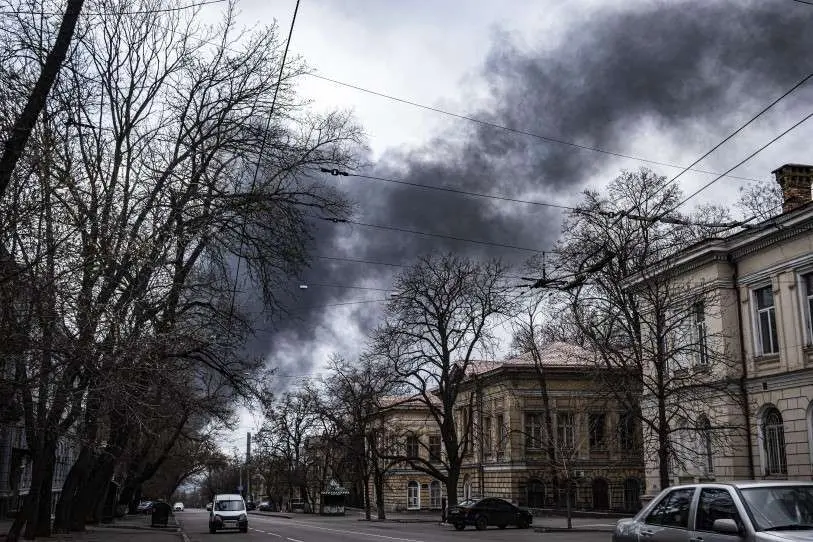Russia bombs the strategic Zatoka bridge in a bid to cut off part of Odessa

The Russian army continues to give no respite in the territories of southern and eastern Ukraine, and after several days of particularly heavy attacks in the vicinity of Mariupol and Kherson, today it was the turn of the city of Odessa. The "pearl of the Black Sea".
Already last Holy Saturday - in the Orthodox calendar - the citizens of the city were shocked after a bombardment of residential buildings left about a dozen civilians dead. "By Easter, many families had returned to Odessa. For weeks they had been hiding from an imminent Russian attack in the countryside or in western Ukraine. But that city in southern Ukraine had long been spared Russian shelling, so many thought they were safe," Ukrainian student Oleksi Mikhailov told DW.

However, the new Russian offensive in the region seems to have a different purpose. The Kremlin army's shelling of the strategic Zatoka drawbridge, several kilometres south of Odessa, is nothing more than Moscow's attempt to isolate the territories separated from the rest of the country by the Dniester estuary. As a result, traffic crossing the river daily over the bridge has had to be temporarily diverted via the E87 international road. This route runs for more than 7.5 kilometres over Transnistrian territory in Moldova.
Photos of the bridge in #Zatoka, #Odessa #Ukraine after the missile strike. pic.twitter.com/tuGLFWDrwf
— Richard Jones (@Richard12545678) April 26, 2022
The importance of this detour would not be significant were it not for the fact that, in the last 24 hours alone, the Moldovan republic of Transnistria - a quasi-independent 'de facto' republic - has suffered a series of terrorist attacks that have heightened tensions. "According to our information, the attempted escalations are related to internal Transnistrian forces that want to start a war and are interested in destabilising the situation," Moldovan President Maia Sandu told a press conference.

Ukrainian presidential adviser Mikhail Podolyak accused Russia of trying to "destabilise" the Moldovan region: "We clearly understand that this is one of the steps of the Russian Federation," said President Volodymir Zelensky. "And it is clear why: to destabilise the situation in the region, to threaten Moldova. They show them that if Moldova supports Ukraine, there will be certain consequences".
The Zatoka bridge, moreover, represented for Kiev one of the only railway routes still under its full control. Since the beginning of the port blockade on the Black Sea side, this crossing had emerged as a promising passage for communications with the westernmost territories of the Odessa region, as well as for Ukrainian exports to other countries such as Romania and Bulgaria.

Meanwhile, in the southeast of the country, Moscow has not let another day go by and, according to Petro Andryushchenko, an adviser to the mayor of Mariupol, has resumed attacks on the Azovstal steelworks on Wednesday. The last bastion of Ukrainian resistance in the town of Mariupol, where about 1,000 civilians and several soldiers of the Kiev army are taking refuge, and where, according to sources from the Azov battalion, there are currently more than 400 wounded. With this renewed official offensive, Putin has put an end to a unilateral ceasefire he announced earlier this week, which has had little real impact.
And while attacks continue in many regions of Kharkov, Izium, Lugansk and Kherson, international authorities warn that Moscow's urban siege practices in Mariupol could spread to other cities. "The cruel logic of these sieges is that the attacker finds it too costly to fight and decides to starve the defending army, and with it women and children," warned former UN humanitarian coordinator Jan Egeland at a press conference organised by the UN Correspondents' Association (UNCA).

"It's a race against time to help eastern and southern Ukraine, where the fighting is intensifying and unfortunately there are not as many witnesses to it as there were in Kiev," Egeland said.
In addition, during Tuesday night, Russian troops launched "three missiles into Ukraine to fly directly over the blocks of our nuclear power plants": Zaporiyia, Khmelnytska and Yuzhnoukrainsk, President Zelenski denounced in a video. This comes just days after the director general of the International Atomic Energy Agency (IAEA), Rafael Mariano Grossi, warned about radiation levels at the Chernobyl plant in the north of the country.
"The radiation level, I would say, is abnormal. There were some moments when the levels increased due to the movement of the heavy equipment that the Russian forces brought here and when they left. We are following that day by day," Grossi said.

Russian President Vladimir Putin has warned in recent hours that Russia will respond with a "blitzkrieg" attack to any strategic interference in what is happening in Ukraine, the scene of a two-month-old Russian military campaign. "If anyone, I insist, sets out to interfere in the ongoing events and creates inadmissible strategic threats to Russia, they should know that our response attacks will be lightning fast," Putin said during a speech to the Council of Parliamentarians in St Petersburg.








